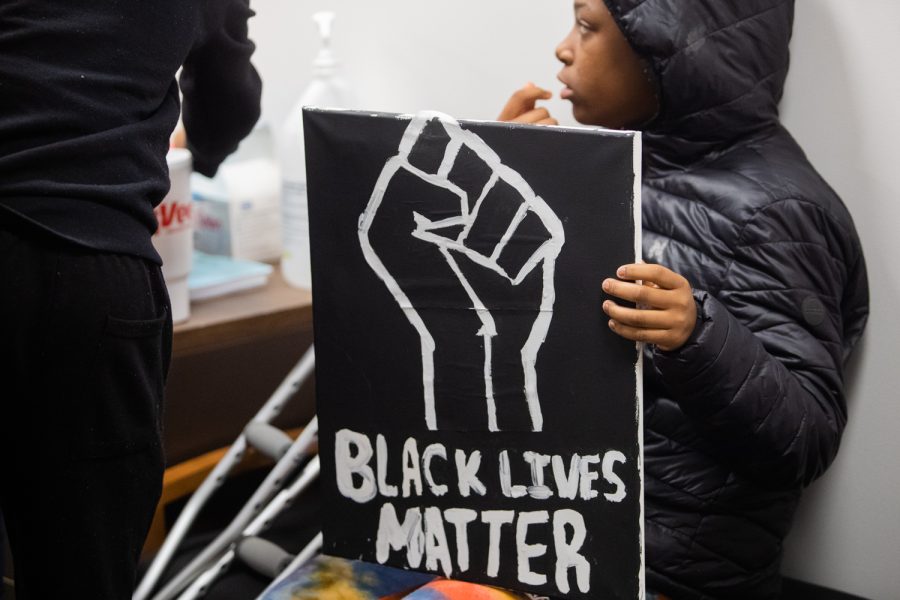Iowa City School Board members commit to efforts to combat racism following student input
Hiring more POC teachers of color, listening to students, and create a shift in culture are ways the Iowa City Community School District plan to combat racist incidents on school campuses following student and community concerns.
A protester holds a sign at a meeting of the Board of Directors at the Iowa City Community School District Administration Building in Iowa City Tuesday, Nov. 9, 2021. Community members protested after a video surfaced on social media of an Iowa City West High School student using a racial slur and blackface.
December 7, 2021
Iowa City Community School District board members plan to focus on the causes and effects of systematic racism on education after students voiced their concerns about racist incidents in community schools.
During a school board meeting in November, students and community members spoke to the board, voicing their concerns about the increase in racism present in schools. Specifically, they were responding to a racist video by a student that surfaced on social media.
A current project the board has is in effort to hire more district administrators of color, school board member J.P Claussen said. The project is an interior teacher hiring process to recruit a person in higher education who is studying to be in the education field.
“So, the first stage of that is we’ve identified talented folks, many of whom are folks of color, and we’re putting them in these fellow positions, which is going to give them a little bit of administrative experience,” he said. “Hopefully, some of them will decide to stay in those roles, and then we’ll pursue administrative roles. And that gets us more administrators of color.”
Another aspect of this project is recognizing parents and support staff who are passionate about teaching and helping them become teachers in the district.
Newly elected board member Maka Pilcher-Hayek said she understands the frustrations of individuals who have experienced racism and hopes during her term that the board will focus on trying to solve the problem in the school district.
“I think we have to commit to working together so that we can serve the children, we can serve our students,” Pilcher-Hayek said.
Racism doesn’t just happen in Iowa City schools, Pilcher-Hayek said. She said the board has been dedicated to fighting racism already through the 2019-2020 Diversity, Inclusion and Equity plan, which is on its second three-year plan.
“Our administration in our school board 100 percent cares about mitigating the effects of systemic racism, the effects that systemic racism has in education,” she said.
Pilcher-Hayek, who ran on a platform of emphasizing the importance of public education, said she believes that systemic racism does affect students’ education. The district’s dedication to combating racism is one reason why she decided to run for a spot on the board.
“If you’re a student, and you feel that you’re experiencing racism in your classroom, how is that not going to affect your learning?” Pilcher-Hayek said.
Tori Cooper, a senior at Tate High School, said she thinks racism is happening in schools because the cases that are reported are being brushed off regardless of who and how many people report experiences.
Cooper spoke to the school board in November about her experience with racism in the district.
“I think there should be real consequences for that because if there’s no consequences everyone’s gonna think it’s okay to do,” Cooper said.
Currently consequences are just suspensions or an email to the schools, Cooper said.
“I was pretty shocked because [in] a lot of cases I feel like it’s bringing a lot of kids together,” Cooper said.
Although Cooper currently attends Tate, she spent time at West High School and was witness to racist incidents there. Cooper said she saw people of color being pulled aside to be searched for drugs, while white kids who were seen smoking would just be told to throw out the cigarette.
“Every school I’ve been at, they’ll try to grab minority student’s bags and try to search them because they think they have drugs or something, when there will be other kids with drugs in their backpacks, and [the students] already passed [the line],” Cooper said.
Claussen said one reason why he thinks racism occurs in schools, specifically in the district, is because Iowa City has become much more diverse in the last 30 years. Claussen also mentioned that because students spend most of their days in schools, racism is amplified there.
“I’m impressed that these students have the courage to come and do that and speak up,” Claussen said. “It reminds you that we’re engaged in this work, and we have to continue and do better.”
Claussen, who was reelected in November, said one thing he hopes to see in terms of combating racism in his second term is diversifying the school’s teachers and administrators.
“There are things we can do to hold ourselves accountable in the moment and one of those things, for example, is to hire more teachers and administrators of color,” Claussen said. “For example, one thing we can do right now is let students see themselves in those roles.”



